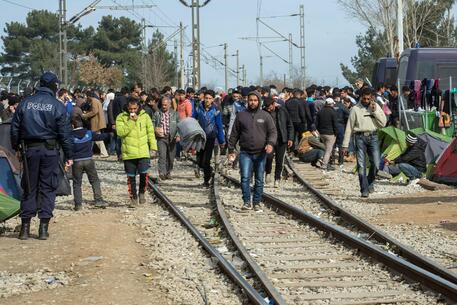(ANSA) - ROME, NOV 25 - So far this year, the German Federal
Police has detected 75,934 unauthorized entries into Germany. In
September, there were 12,700 unauthorized entries, and 13,400 in
October. The last time Germany recorded five-digit monthly
figures was during the migrant crisis in February 2016.
Meanwhile, Belgium has recently received more than 4,000 asylum
applications per month and is having trouble finding enough
accommodation for asylum seekers. For years, Belgium has been
advocating a common European approach and is in favor of the
EU's migrant relocation mechanism, but on the condition that
asylum seekers are actually registered in the country of arrival
and that secondary movements are prevented.
The Belgian Secretary of State Nicole de Moor traveled to Congo
last week and plans to visit Egypt. "We do this on a bilateral
basis and it's having an effect, but we get better results if
the EU as a whole puts its collective weight in." She
particularly appreciated the emphasis the new action plan puts
on cooperation with countries of origin and transit, as well as
the discouragement of people who try to reach Europe but are
unlikely to be accepted as asylum seekers.
A new crisis is brewing along the Western Balkan Route
In recent months, there has been a significant increase in the
arrival of irregular migrants via the Western Balkan route, and
"a large number of them come via Serbia, because they enter that
country without visas and then proceed to the member states of
the Union," said Commissioner Johansson on November 18.
In response to pressure from EU countries, Serbia has aligned
its visa policies with those of the EU for some countries in
Asia, Africa and the Caribbean. The visa-free entry agreements
with Tunisia and Burundi expired in November. Serbia will soon
introduce visas with two more countries, Serbian President
Aleksandar Vučić announced, but he did not specify which.
Austrian Chancellor Karl Nehammer said during his visit to
Belgrade on November 16: "Thank you the President of Serbia for
advocating the end of this asylum tourism caused by visa
liberalization for citizens of India, Tunisia and other
countries. We had a large number of asylum seekers from India,
Vučić reacted and did not leave Austria in the lurch."
On November 16, Serbia, Hungary and Austria signed a memorandum
on strengthening cooperation on migration and border protection,
under which police officers of the three countries will work
together.
Bosnia and Herzegovina (BiH), Croatia and Slovenia have become
transit countries for migrants heading towards Western Europe.
In BiH, there are currently about 2,600 migrants registered in
reception centers, while about another 700 migrants mainly
reside close to the EU border. Citizens of Burundi are among the
three most numerous groups of arrivals, which is a direct
consequence of the visa-free regime that the country had with
BiH's neighbor Serbia.
The authorities in BiH have identified the high-risk countries
with which readmission agreements should be signed, but these
countries are delaying the process. So far, there is an
agreement only with Pakistan. BiH is responding much better to
migration than in previous years, but even today the number of
policemen protecting the state's borders is still considered
insufficient.
Croatia, Slovenia and Bulgaria - external border management in
the Schengen area
Croatia recorded a sharp increase of 146 percent in illegal
crossings, according to Žarko Katic, State Secretary in the
Croatian Ministry of the Interior. And the countries of origin
of the migrants flowing into Croatia have also changed.
Traditionally, migrants entering Croatia came from the Middle
East and North and Sub-Saharan Africa. This year, the top five
countries of origin are Iraq, Burundi, Turkey, Afghanistan and
Cuba.
Austrian Interior Minister Gerhard Karner caused concern in
Croatia recently, saying he would oppose the extension of the
Schengen area to Croatia, Bulgaria and Romania. Austria was
experiencing enormous migrant pressure, he added. This year,
Austria has recorded around 100,000 migrants, of whom 75,000
were not previously registered in any of the other EU member
states. However, in Zagreb on Wednesday, Austrian Chancellor
Nehammer said that Austria would support Croatia's bid to join
the Schengen area.
Croatia's northwestern neighbor Slovenia also experienced a
significant year-on-year increase of 160 percent to 21,467
illegal border crossings in the first 10 months of 2022. And
most of these migrants came from countries like Burundi, India,
Cuba, Afghanistan and Bangladesh. However, after Serbia aligned
its visa policy with the EU, the number of Burundian and
Tunisian migrants had already decreased, the Slovenian Ministry
of the Interior said. Applications for international protection
in Slovenia also multiplied to 21,452 in the first 10 months of
the current year, up from just 4,174 for the same period of
2021. According to the latest data, only 167 applications for
international protection were approved so far this year.
Even though Slovenia supports Croatia's accession to the
Schengen area, Foreign Minister Tanja Fajon said that the
country would introduce border controls with Croatia if
necessary. She said that Slovenia didn't want to become a pocket
for illegal migration.
Meanwhile, Schengen candidate Bulgaria has recorded an
increasing number of migrants trying to illegally cross the EU
external border from Turkey since the summer of 2022. In recent
weeks, there have been daily accidents caused by smugglers and
migrants. In September, a state of emergency was declared for
the first time in three southern regions of Bulgaria due to
increased migration pressure. Meanwhile, Europol has discussed
the formation of joint border intervention teams with Sofia.
This article is published Fridays. The content is based on news
by agencies participating in the enr: AFP, ANSA, Belga, BTA,
dpa, EFE, FENA, HINA, STA, Tanjug (ANSA).
Migration crisis at Europe's doorstep (2)
Western Balkan route poses new problems after France-Italy spat
